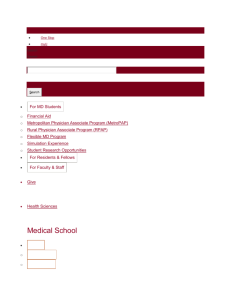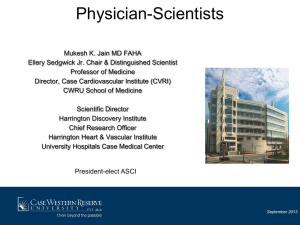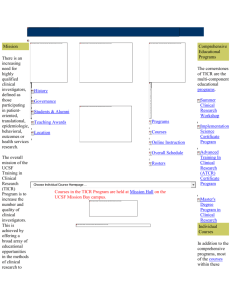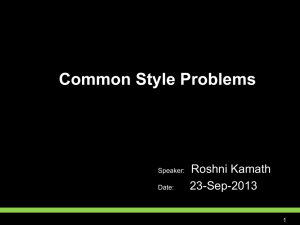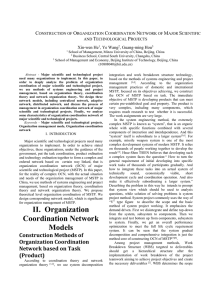Please read our guidelines prepared specifically for MSTP applicants.
advertisement
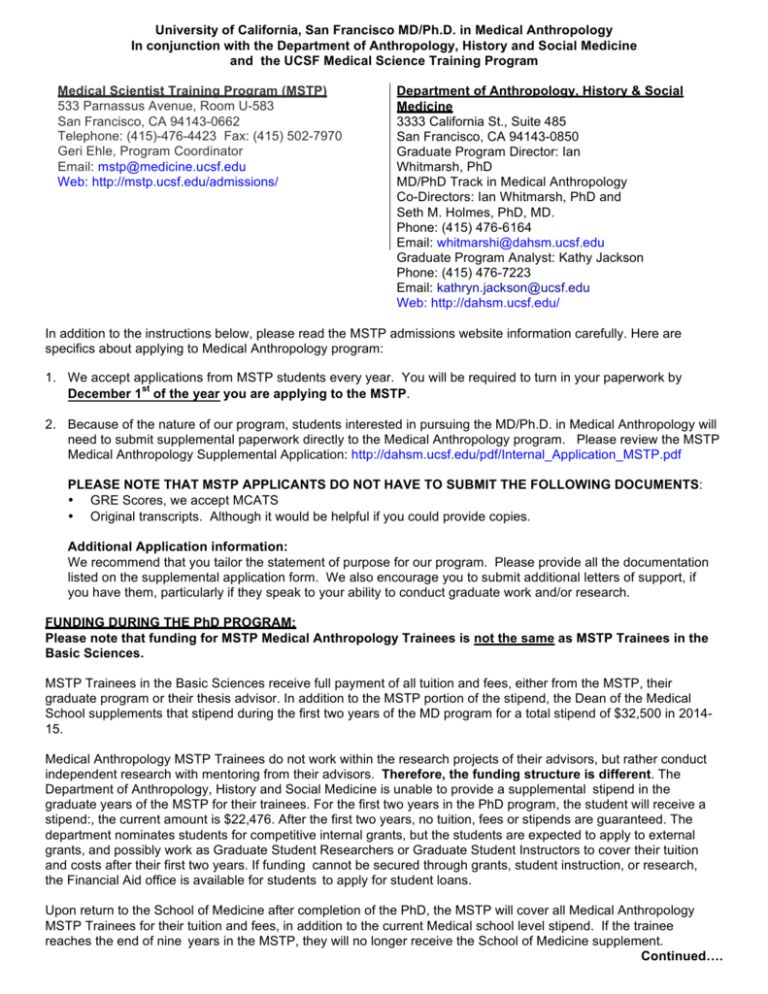
University of California, San Francisco MD/Ph.D. in Medical Anthropology In conjunction with the Department of Anthropology, History and Social Medicine and the UCSF Medical Science Training Program Medical Scientist Training Program (MSTP) 533 Parnassus Avenue, Room U-583 San Francisco, CA 94143-0662 Telephone: (415)-476-4423 Fax: (415) 502-7970 Geri Ehle, Program Coordinator Email: mstp@medicine.ucsf.edu Web: http://mstp.ucsf.edu/admissions/ Department of Anthropology, History & Social Medicine 3333 California St., Suite 485 San Francisco, CA 94143-0850 Graduate Program Director: Ian Whitmarsh, PhD MD/PhD Track in Medical Anthropology Co-Directors: Ian Whitmarsh, PhD and Seth M. Holmes, PhD, MD. Phone: (415) 476-6164 Email: whitmarshi@dahsm.ucsf.edu Graduate Program Analyst: Kathy Jackson Phone: (415) 476-7223 Email: kathryn.jackson@ucsf.edu Web: http://dahsm.ucsf.edu/ In addition to the instructions below, please read the MSTP admissions website information carefully. Here are specifics about applying to Medical Anthropology program: 1. We accept applications from MSTP students every year. You will be required to turn in your paperwork by December 1st of the year you are applying to the MSTP. 2. Because of the nature of our program, students interested in pursuing the MD/Ph.D. in Medical Anthropology will need to submit supplemental paperwork directly to the Medical Anthropology program. Please review the MSTP Medical Anthropology Supplemental Application: http://dahsm.ucsf.edu/pdf/Internal_Application_MSTP.pdf PLEASE NOTE THAT MSTP APPLICANTS DO NOT HAVE TO SUBMIT THE FOLLOWING DOCUMENTS: • GRE Scores, we accept MCATS • Original transcripts. Although it would be helpful if you could provide copies. Additional Application information: We recommend that you tailor the statement of purpose for our program. Please provide all the documentation listed on the supplemental application form. We also encourage you to submit additional letters of support, if you have them, particularly if they speak to your ability to conduct graduate work and/or research. FUNDING DURING THE PhD PROGRAM: Please note that funding for MSTP Medical Anthropology Trainees is not the same as MSTP Trainees in the Basic Sciences. MSTP Trainees in the Basic Sciences receive full payment of all tuition and fees, either from the MSTP, their graduate program or their thesis advisor. In addition to the MSTP portion of the stipend, the Dean of the Medical School supplements that stipend during the first two years of the MD program for a total stipend of $32,500 in 201415. Medical Anthropology MSTP Trainees do not work within the research projects of their advisors, but rather conduct independent research with mentoring from their advisors. Therefore, the funding structure is different. The Department of Anthropology, History and Social Medicine is unable to provide a supplemental stipend in the graduate years of the MSTP for their trainees. For the first two years in the PhD program, the student will receive a stipend:, the current amount is $22,476. After the first two years, no tuition, fees or stipends are guaranteed. The department nominates students for competitive internal grants, but the students are expected to apply to external grants, and possibly work as Graduate Student Researchers or Graduate Student Instructors to cover their tuition and costs after their first two years. If funding cannot be secured through grants, student instruction, or research, the Financial Aid office is available for students to apply for student loans. Upon return to the School of Medicine after completion of the PhD, the MSTP will cover all Medical Anthropology MSTP Trainees for their tuition and fees, in addition to the current Medical school level stipend. If the trainee reaches the end of nine years in the MSTP, they will no longer receive the School of Medicine supplement. Continued…. PhD CURRICULUM Once a student is accepted to MSTP and to the Medical Anthropology program, they will be required to discuss their PhD curriculum with our program director, Ian Whitmarsh. MSTP students are expected to begin the PhD program at the beginning of their 3rd year at UCSF. All students accepted to the medical anthropology program are required to take core classes at both UC San Francisco and UC Berkeley. Since students begin our regular PhD program every two years (in even years - 2014, 2016, 2018, etc.), UCSF core courses are only offered every two years. This means that some MSTP students will enter in odd years (2013, 2015, 2017, etc), when no core courses are being taught at UCSF. To facilitate students who start the PhD program in odd years, students will begin their program by taking a core class at UC Berkeley (Anth 240A), directed reading courses with UCSF faculty or taking electives (such as language courses) at UCSF/UCB. Year 1 Year 2 Year 3 Year 4 Year 5 Year 1 Year 2 Year 3 Year 4 Year 5 Table 1: MSTP students entering the PhD program in 2014, 2016, 2018, etc. Location Fall Winter Spring Summer San Francisco 205A 205B 211A Prequalifying exams Berkeley 240A 240B San Francisco 211B 211C Berkeley Electives Electives San Francisco Electives Electives Electives Qualifying Exam Berkeley Electives Electives N/A Dissertation Research N/A Dissertation Write up Table 2: MSTP students entering the PhD program in 2013, 2015, 2017, etc. Location Fall Winter Spring Summer San Francisco Directed Reading courses with advisors Berkeley 240A 240B San Francisco 205A 205B 211A Prequalifying exams Berkeley Electives San Francisco 211B 211C Qualifying Exam Berkeley Electives N/A Dissertation Research N/A Dissertation Write up UCSF Class Description 205A 205B 211 series Prequalifying Exam Qualifying Exam UC Berkeley 240 A 240 B Electives Introduction to Medical Anthropology Theory Introduction to Medical Anthropology Theory - Continuing Qualitative methods series - Research training Oral exam to evaluate student progress Oral exam required to advance to candidacy Introduction to Socio-cultural Anthropology Theory Introduction to Socio-cultural Anthropology Theory - Continuing Students take courses at either campus focused on their areas of interest. These also include language study and statistics.
